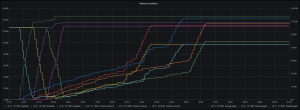I discovered last night that network bridges on linux have their Maximum Transmission Unit (MTU) overwritten by whatever is the MTU value of the most recent interface added to the bridge. This is bad. Very bad. Specifically this is bad because MTU matters for accurately describing the capabilities of the network path the packets will travel on, so it shouldn’t be clobbered willy nilly.
Here’s an example of the behaviour:
# ip link add egr-br-ens1f0 mtu 1500 type bridge
# ip link show dev egr-br-ens1f0
3: egr-br-ens1f0: <BROADCAST,MULTICAST> mtu 1500 qdisc noop state DOWN mode DEFAULT group default qlen 1000
link/ether 7e:33:1b:30:d8:00 brd ff:ff:ff:ff:ff:ff
# ip link add egr-eaa64a-o mtu 8950 type veth peer name egr-eaa64a-i
# ip link show dev egr-br-ens1f0
3: egr-br-ens1f0: <BROADCAST,MULTICAST> mtu 1500 qdisc noop state DOWN mode DEFAULT group default qlen 1000
link/ether 7e:33:1b:30:d8:00 brd ff:ff:ff:ff:ff:ff
# brctl addif egr-br-ens1f0 egr-eaa64a-o
# ip link show dev egr-br-ens1f0
3: egr-br-ens1f0: <BROADCAST,MULTICAST> mtu 8950 qdisc noop state DOWN mode DEFAULT group default qlen 1000
link/ether da:82:cf:34:13:60 brd ff:ff:ff:ff:ff:ffSo you can see here that the bridge had an MTU of 1,500 bytes. We create a veth pair with an MTU of 8,950 bytes and add it to the bridge. Suddenly the bridge’s MTU is 8,950 bytes!
Perhaps this is my fault — brctl is pretty old school. Let’s use only ip commands to configure the bridge.
# ip link add mgr-br-ens1f0 mtu 1500 type bridge
# ip link show dev mgr-br-ens1f0
6: mgr-br-ens1f0: <BROADCAST,MULTICAST> mtu 1500 qdisc noop state DOWN mode DEFAULT group default qlen 1000
link/ether 82:d8:df:15:40:01 brd ff:ff:ff:ff:ff:ff
# ip link add mgr-eaa64a-o mtu 8950 type veth peer name mgr-eaa64a-i
# ip link show dev mgr-br-ens1f0
6: mgr-br-ens1f0: <BROADCAST,MULTICAST> mtu 1500 qdisc noop state DOWN mode DEFAULT group default qlen 1000
link/ether 82:d8:df:15:40:01 brd ff:ff:ff:ff:ff:ff
# ip link set mgr-eaa64a-o master mgr-br-ens1f0
# ip link show dev mgr-br-ens1f0
6: mgr-br-ens1f0: <BROADCAST,MULTICAST> mtu 8950 qdisc noop state DOWN mode DEFAULT group default qlen 1000
link/ether 22:55:4a:a8:19:00 brd ff:ff:ff:ff:ff:ffThe same problem occurs. Luckily, you can specify the MTU when you add an interface to a bridge, like this:
# ip link add zgr-br-ens1f0 mtu 1500 type bridge
# ip link show dev zgr-br-ens1f0
9: zgr-br-ens1f0: <BROADCAST,MULTICAST> mtu 1500 qdisc noop state DOWN mode DEFAULT group default qlen 1000
link/ether 7a:54:2c:04:5f:a8 brd ff:ff:ff:ff:ff:ff
# ip link add zgr-eaa64a-o mtu 8950 type veth peer name zgr-eaa64a-i
# ip link show dev zgr-br-ens1f0
9: zgr-br-ens1f0: <BROADCAST,MULTICAST> mtu 1500 qdisc noop state DOWN mode DEFAULT group default qlen 1000
link/ether 7a:54:2c:04:5f:a8 brd ff:ff:ff:ff:ff:ff
# ip link set zgr-eaa64a-o master zgr-br-ens1f0 mtu 1500
# ip link show dev zgr-br-ens1f0
9: zgr-br-ens1f0: <BROADCAST,MULTICAST> mtu 1500 qdisc noop state DOWN mode DEFAULT group default qlen 1000
link/ether ae:59:0b:a6:46:94 brd ff:ff:ff:ff:ff:ffAnd that works nicely. In my case, this ended up with me writing code to lookup the MTU of the bridge I was adding the interface to, and then specifying that MTU back when adding the interface. I hope this helps someone else.
